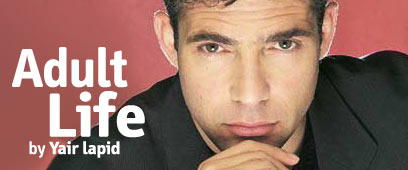

Children lighting Chanukah candles
Photo: Amit Magal
On Sunday we lit Chanukah candles, and, as always, it was a beautiful moment. We shut off the light in the living room and the little faces of our kids looked festive and serious in the flickering candlelight. Lior recited the blessings, remembering almost all the words, we all sang the rest of the prayers together, and my significant other prepared the fried doughnuts that shriveled up for some reason and were dunked in lots of sugar in order to make up for what was lost in the frying.
Outside it was raining but inside it was warm and cozy. Just as we wrapped up the songs, my son Yoav called from the army to say he missed us. As always there was something powerful and soothing in the knowledge that the same ceremony was going on in every home in Israel; the same words, including the fact that no one really knows what happens to the Greeks in the fifth verse of "Rock of Ages."
It made me think about the real miracle of Chanukah, the miracle that no one talks about: The fact that life in Israel is good.
Not polite to say, but…
It's totally unfashionable, and a bit anti-social, to talk about the fact that things are good. But we live in a country that treats its people well. Not that it is so hard to find the bad things: The open sewer in the Arab town of Umm al-Fahm, the families in Yeruham that can’t even afford sugar to dunk the Chanukah doughnuts they don't have; the homeless guy that’s been lying on a bench for three days on Rothschild Boulevard in Tel Aviv wrapped in a blanket and its impossible to tell if he's frozen to death or just asleep.
These are horrible things, but this is still a country that is a good place to live in for most of its residents, despite what they may think.
Two billion people around the world earn less than USD 100 a month. More than half of the population on the globe has never spoken on a telephone. Millions of Africans are starving to death or dying from AIDS, or dying in wars the reasons for which no one can remember. Some 30 million Americans have no health insurance. These are the major things that have been spared from us. We may take them for granted but we shouldn't.
Living here is worthwhile
We would have been clumped together with the third world if we relied on the dry facts. To begin with, we have no natural resources, we are in a constant state of war, and we have the highest defense expenditure in the world. Most of the countries in the neighborhood have no trade or diplomatic relations with us and yet, we belong to the small club of countries in which living is worthwhile.
At the beginning of Chanukah I went to wish some Pilipino friends who live near the old Central Bus Station in Tel Aviv a merry Christmas. Ten people living in a two-room apartment lit a pine bough and exchanged small practical gifts like towels or warm socks. We sat and discussed their lives here. Everywhere they go they carry their passports. They earn little and are hunted by immigration police yet they are desperate to stay.
Some 40.1 percent people in the Philippines live under the poverty line yet it’s a country without enemies. It's 15 times larger than Israel and coconut trees grow there without anyone asking them to. But they prefer to be here, just to touch the Israeli dream.
Miracle of normalcy
So many wonderful things happen here without anyone paying attention. One seldom takes notice when things are cruising along. You only notice the traffic light when it malfunctions, electricity when there's an outage, running water from the faucet when its rust colored.
I was once driving in Cuba down a multi-lane highway that suddenly ended. One minute I was on the freeway, the next, without any warning, I was on a potholed dirt road flanked by rows of long leaved greenery of banana groves swaying in the wind like fanning waiters. This would never happen in Israel. It would take exactly five minutes for someone to wake the transportation minister up and yell at him that he should be ashamed.
Screw -ups happen all the time, sure, but the basic things work. Hospitals are open around the clock, no one dies of hunger, planes arrive and take off, journalism is invasive but unfettered, illiteracy rates are almost zero, 993 of every 1,000 infants are born healthy and our shekel keeps its value. We are so used to all of this that we've stopped paying attention.
Moreover, we are not even worried. We are confident that the hundreds of little details that make life tolerable will continue to function. Tomorrow morning the buses will run as usual, coffee shops will be open; a package of six Chanukah doughnuts at the supermarket will still cost NIS 9.95. Two unshaved guys will empty the trash on the street. The beach is free. If you think that all of this is to be taken for granted then you don't understand miracles.
The modern-day miracle of the oil is that normalcy burns here seven days a week. Even major criminals know that in Israel you cannot buy a judge and our colonels and generals would never even think about staging a military takeover of the country. We have received Nobel prizes each of the past two years, and that's more than the Japanese.
Strong democracy
Why does it seem trivial to us that the country has absorbed almost 1.5 million new immigrants? That would be like asking England to resettle 10 million people, or the Americans to welcome 50 million newcomers. For China, it would be 167 million. They would all collapse under the task. Only in Israel, the land of miracles, have most of the new immigrants found work, housing, and education. They serve in the army and sing Chanukah songs.
Even when we despair over the fact that the prime minister's son has been convicted of wrongdoing by his own admission, we know that such a thing could not have happened in South America or in Africa or even in the Far East.
You know what? It would not happen in France or Spain either. Only a democracy sure of itself punishes the offspring of its leaders.
Sometimes I look at all of this with bewilderment and ask myself why we complain constantly. Other times it seems to me that this is our secret. The fact that we are never satisfied makes it that we only see the downside and nothing gets away from our covetous eyes. Could it be that a national character that is so irritating is the only chance for the poor, the uneducated and everyone else that is not a game player?
Maybe our tendency to believe the worst about ourselves turns us into one of the most dynamic societies in the world. Maybe once a year we are allowed to look at the cup which is two-thirds full, if only to celebrate a holiday that deals with miracles. We need to be silent about the fact that most of us have it good, the enterprise is ongoing, and a miracle has happened here. We are the miracle.















